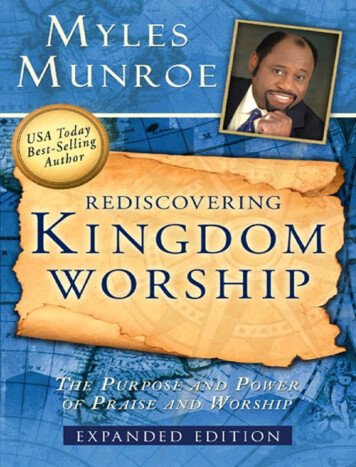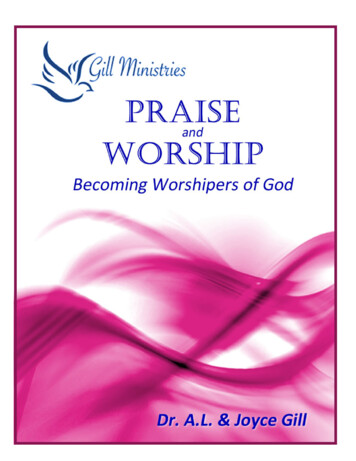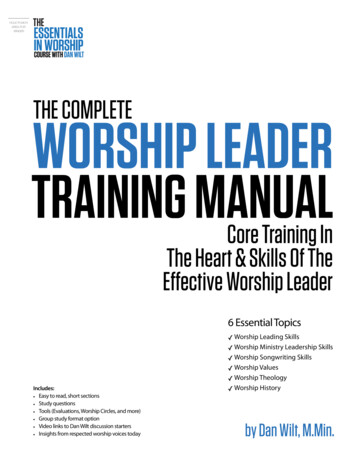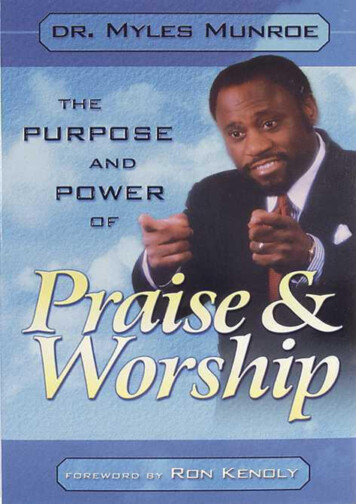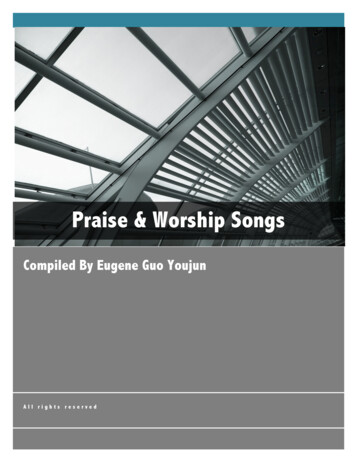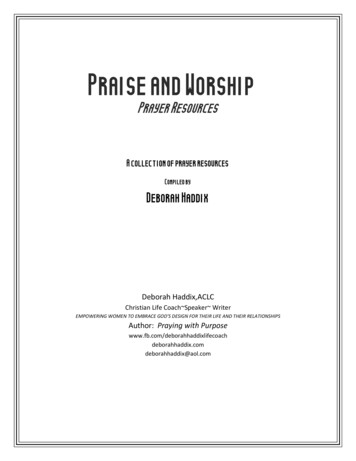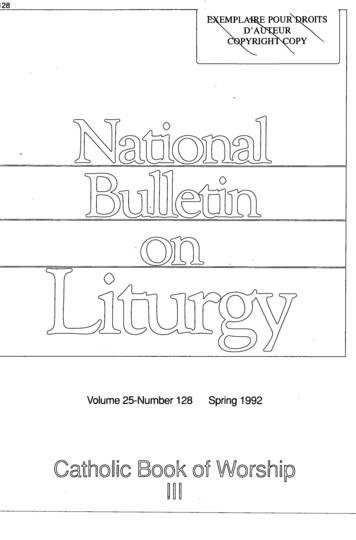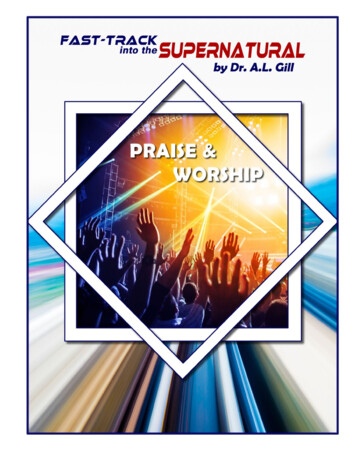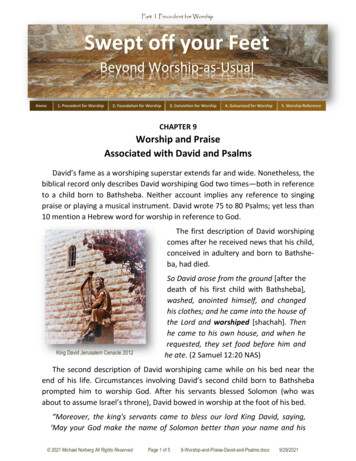
Transcription
CHAPTER 9Worship and PraiseAssociated with David and PsalmsDavid’s fame as a worshiping superstar extends far and wide. Nonetheless, thebiblical record only describes David worshiping God two times―both in referenceto a child born to Bathsheba. Neither account implies any reference to singingpraise or playing a musical instrument. David wrote 75 to 80 Psalms; yet less than10 mention a Hebrew word for worship in reference to God.The first description of David worshipingcomes after he received news that his child,conceived in adultery and born to Bathsheba, had died.King David Jerusalem Cenacle 2012So David arose from the ground [after thedeath of his first child with Bathsheba],washed, anointed himself, and changedhis clothes; and he came into the house ofthe Lord and worshiped [shachah]. Thenhe came to his own house, and when herequested, they set food before him andhe ate. (2 Samuel 12:20 NAS)The second description of David worshiping came while on his bed near theend of his life. Circumstances involving David’s second child born to Bathshebaprompted him to worship God. After his servants blessed Solomon (who wasabout to assume Israel’s throne), David bowed in worship at the foot of his bed.“Moreover, the king's servants came to bless our lord King David, saying,‘May your God make the name of Solomon better than your name and his 2021 Michael Norberg All Rights ReservedPage 1 of 21
throne greater than your throne’ And the king bowed [shachah, renderedbowed in worship in NIV] himself on the bed.” (I Kings 1:47 NAS)In two Psalms, David declared his intention to worship God by saying:“I will enter Your house, At Your holy temple I will bow [shachah] in reverence for You” (Psalm 5:7 NAS)“I will bow down [shachah] toward Your holy temple And give thanks [yadah]” (Psalm 138:2 NAS)In two additional Psalms, David extends an invitation for others to worshipGod by declaring; “let us worship and bow down” (Psalm 95:6 NAS) and “let usworship at His footstool” (Psalm 132:7 NAS). This language implies that Davidworshiped God at other times and led others to do so. It also confirms the factthat he employed gestures of bowing in his worship. David’s terminology in thePsalms clearly distinguishes gestures of worship from expressions of praise.David Bowed before Jonathan and SaulOn separate occasions, David bowed before Jonathan and later before KingSaul in what appears to be a cultural expression of honor and respect. In Jonathan’s case, circumstances suggest the possibility that David may have extendedhimself in worship toward God rather than Jonathan his friend. David rose from the south side and fell [naphal] on his face to the ground,and bowed [shachah] three times. And they [David and Jonathan] kissed eachother and wept together, but David wept the more. (1Samuel 20:41 NAS)With Saul, David’s bow appears to venerate the office of the King rather thanin worship to God.David arose and went out of the cave and called after Saul, saying, “My lordthe king!” And when Saul looked behind him, David bowed [shachah] with hisface to the ground and prostrated [shachah] himself. (1Samuel 24:8 NAS)Bowing before DavidWith striking distinction, the Bible describes eleven people bowing down toDavid on fourteen occasions. Abigail, Bathsheba, Mephibosheth, the woman ofTekoa, Joab, Absalom, Ziba, Ahimaaz, Araunah, Nathan, and Ornan all renderedhomage to him. Translated from the Hebrew word shachah, which also denotesworship, they bowed or prostrated themselves before David both before and after he assumed Israel’s throne as King. Other people inevitably bowed before David as King in keeping with this custom adopted from other nations. In a separatePage 2 of 5
account, an entire assembly bowed before the Lord and David simultaneously, yethe did not object.Then David said to all the assembly, “Now bless the Lord your God.” And allthe assembly blessed the Lord, the God of their fathers, and bowed low[qadad] and did homage [shachah] to the Lord and to the king. (1Chronicles29:20 NAS)Throughout the Bible, angels refused to share this expression of homage withGod. Twice, John fell down to worship at the feet of the angel. Each time the angel rebuked him saying, “You must not do that! I am a fellow servant with you andyour brothers Worship God!”1Praise and Worship in the PsalmsDavid and other psalmists emphasize praise over worship by a margin greaterthan ten to one. Words for praise appear in Psalms over 150 times in 147 verses.In addition, many psalms convey praise for God without using a specific word forpraise in the Hebrew text. For example, Psalm 145 praises God with the followingwords of descriptive adulation:The LORD is gracious and merciful; Slow to anger and great in lovingkindness.The LORD is good to all, And His mercies are over all His works.(Psalm 145:8-9 NAS)In contrast, only 12 psalms (out of 150) mention a Hebrew word for worship inreference to God, Psalms 5, 22, 29, 45, 66, 86, 95, 96, 97, 99, 132, and 138. Ofthese 12 psalms, ten mention a Hebrew word for worship and praise together.Only six psalms mention a Hebrew word for worship and singing together in thesame context: Psalms 22, 66, 95, 96, 132, and 138. Two psalms, 5 and 29, mentionworship alone without using a Hebrew word for praise.NAS translators render the Hebrew word abad (ä-văd') as worship in six out of290 references pertaining to God. Translators for the NKJ, ESV, NIV, and RSV allrender abad as “serve” in Psalm 2:11. However, the NAS deviates from them andfrom its own convention in this psalm. Rather than translating abad as serve, itchose the word worship. Instead of “Serve the LORD with reverence”, they use:“Worship [ abad] the LORD with reverence And rejoice with trembling.”(Psalm 2:11 NAS)1Revelation 19:10 and 22:9 ESVPage 3 of 5
According to the Theological Wordbook of the Old Testament and others, theHebrew verb, abad (pronounced ä-văd') acquired the notion of worship and obedience from its Arabic root. However, the Old Aramaic root suggests service instead because it means to do or make.2In Psalms 100 and 102, the NAS reverts back to its convention by rendering abad as “serve”. The NIV however, reverses itself by rendering abad as worshipin both Psalms.Serve [ abad] the LORD with gladness; Come before Him with joyful singing.(Psalm 100:2 NAS)When the peoples are gathered together, And the kingdoms, to serve [ abad]the LORD. (Psalm 102:22 NAS)Six Prophetic Proclamations Emphasize an All-Inclusive ResponseKnowing the past clarifies the presentand often illuminates the futureFive Psalms and one song sung in heaven mention worship and praise togetherin a future context, emphasizing an all-inclusive response. Psalms 22, 66, 86, 96,138, and Revelation 15 assert prophetic proclamations waiting for fulfillment.6 Prophetic Proclamations Involving Multitudes that willWorship or Bow in a Context of Singing, Music, and/or PraiseWorshipersAll InclusiveMultitudesTimes ShachahAssociationNAS VerseAll the Families of the NationsPsa 22:25-27Psa 66:4Psa 96:4, 9Psa 86:9Rev 15:2-4Psa 138:2, 4All the EarthAll NationsAll Kings1. all the families of the nations will worship [NIV renders shachah as bowdown] before You. (Psalm 22:27 NAS) [vss. 25-26 include references to praise]2. “All the earth will worship [NIV renders shachah as bow down to] You, Andwill sing praises to You; They will sing praises to Your name.” Selah. (Psalm66:4 NAS)2Harris, Archer, Waltke, Theological Wordbook of the Old Testament, Moody Bible Institute ofChicago, 1980, p. 639. Gesenius’ Hebrew-Chaldee Lexicon to the Old Testament, Baker BookHouse, Grand Rapids, 1979, p. 598.Page 4 of 5
3. All nations whom You have made shall come and worship [shachah] beforeYou, O Lord, And they shall glorify [kabad, to honor] Your name. (Psalm 86:9NAS)4. Worship [shachah] the LORD in holy attire; Tremble before Him, all the earth.(Psalm 96:9 NAS) [vs. 1,2 sing; vs. 4 encourages praise]5. I will bow down [shachah] toward Your holy temple And give thanks [yada alsomeans to laud or praise] to Your name for Your lovingkindness and Your truth; All the kings of the earth will give thanks [yada] to You, O LORD, When theyhave heard the words of Your mouth. (Psalm 138:2, 4 NAS)6. “All the nations will come and worship [proskuneo] before you, for yourrighteous acts have been revealed.” (Revelation 15:4 NAS) [vss. 2-3 involvemusic with harps and songs]Three All-Inclusive Prophetic Proclamations (without praise)1. “All mankind will come to bow down [shachah] before Me,” says the Lord.(Isaiah 66:23 NAS) [Isaiah 66 does not mention praise]2. all the coastlands of the nations will bow down [NIV renders shachah asworship] to Him, everyone from his own place. (Zephaniah 2:11 NAS) [no mention of praise]3. For it is written, “As I live, says the Lord, every knee shall bow [kampto] to Me,and every tongue shall give praise [exomologeo] to God.” (Romans 14:11 NAS)Previous Chapter: Worship and Praise Converge in HeavenHome1. Precedent for Worship2. Foundation for WorshipNext Chapter: Worship and PraiseDistinguished in Principle Blended in Practice3. Conviction for WorshipPage 5 of 54. Galvanized for Worship5. Worship Reference
David and other psalmists emphasize praise over worship by a margin greater than ten to one. Words for praise appear in Psalms over 150 times in 147 verses. In addition, many psalms convey praise for God without using a specific word for praise in the Hebrew te
